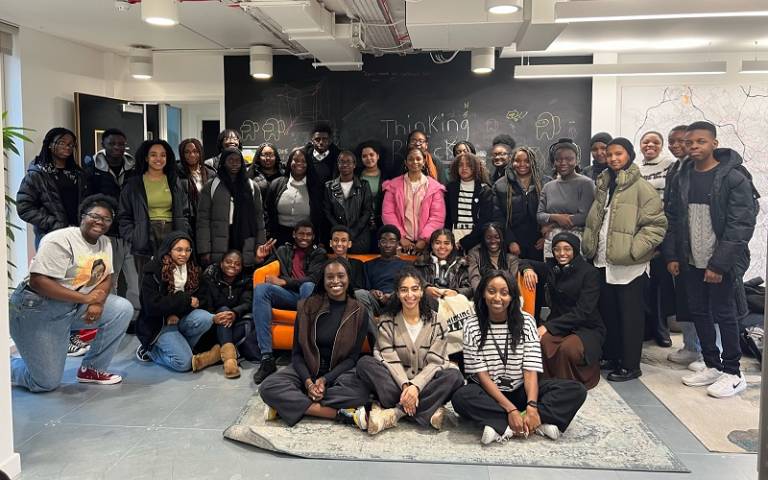UCL Computer Science partners with Thinking Black to launch new outreach initiative
21 July 2023
The department has teamed up with social enterprise Thinking Black to inspire students from black communities into computer science. The initiative has seen the development of a new short-course on Artificial Intelligence (AI) and Bias, as well as an on-campus bootcamp day.

Recognising the underrepresentation of Black students in both the department and the wider tech industry, UCL Computer Science has partnered with Thinking Black to engage and inspire a new generation of Black students into the subject.
Thinking Black, which was founded in 2020 by UCL PhD student Hope Oloye, seeks to educate, equip and empower young Black British voices with skills relating to academic and creative writing, and public speaking. Working with Black state-school students aged 11 to 18 years, the organisation runs writing, speaking and arts programmes.
AI and Bias programme
Following the new partnership, a new computer science programme in Artificial Intelligence and Bias has been developed, which explores the benefits of AI and social justice.
The short-course was designed by Joshua Omolegan, a current 3rd-year undergraduate studying Computer Science at the University of Oxford. With experience in facilitating machine learning workshops and tutoring in mathematics and computer science, Joshua brought valuable expertise to the development of the course.
"The AI and Bias module aims to introduce Black A-level students to popular machine learning algorithms and to how bias can occur in such models," explains Joshua Omolegan. "Through lectures and discussion sessions, students are encouraged to think critically about the effects of the commercial use of biased models and to evaluate whether Machine Learning does more harm than good, taking into account both positive and negative case studies of its applications."
The response to the programme has been overwhelmingly positive, with 58 students attending the introductory lecture, and eight students staying on to complete the course. Participants have expressed enthusiasm and fascination about the programme’s content, highlighting the importance of understanding bias in AI. One student commented, "Computing has always been an interest, so learning that there could be potential 'bias' is absolutely intriguing."

Bootcamp day
To further inspire the students, UCL Computer Science organised an on-campus bootcamp day.
Year-12 students from Thinking Black programmes immersed themselves in various workshops, led by Computer Science research groups. The day began with a talk by Cybersecurity CDT Manager, Pui Sin, who provided insights into the centre’s research and the world of cybersecurity.
Chimdi Igwe and Kyle Beadle, CDT Cybersecurity PhD students, shared their journeys into cybersecurity, inspiring students about the possibilities in the field.
Head of Department, Professor Steve Hailes, also participated in the outreach day, offering valuable guidance on UCAS applications and the admissions process.
The afternoon saw students exploring virtual reality (VR) and testing equipment with VR Lab Manager David Swapp, while UCL Interaction Centre Director, Professor Yvonne Rogers, gave a thought-provoking presentation on how user experience and engaging design are both critical components of any digital product, including virtual reality software, chatbots, smartphone apps and more.
Students then took part in interactive demos, led by postdoc researchers and PhD students. From a thermal textile visualizer to a voicebot prototype, the students got hands-on experience with cutting-edge technologies.
The collaborative effort between UCL Computer Science and Thinking Black demonstrates a committed approach to address underrepresentation in the field of computer science. By inspiring and engaging black students through innovative programmes and hands-on experiences, the initiative sets a positive trajectory towards fostering diversity and inclusivity at UCL and beyond.
Please visit the UCL Computer Science outreach webpages for more information about our activities.
 Close
Close

